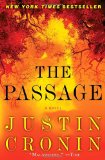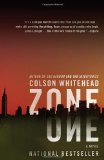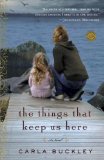Summary | Excerpt | Reviews | Beyond the book | Read-Alikes | Genres & Themes | Author Bio

A combination medical thriller, horror story, and road novel, The Passage is a richly compelling tale of life after an apocalyptic event changes the world as we know it. It was also one of the most 'buzzed' about books of summer 2010, when first published in hardcover (and when we first reviewed it).
If I wanted to be snarky, I would say that you may have read The Passage in the 70's when it was called The Stand. There's no getting around it; Justin Cronin's first novel will give fans of Stephen King's classic an acute sense of déjà vu, with its notable similarities in plot, characters and settings. What makes this arguably forgivable is that Cronin's writing style is more refined than King's, and his characters more likeable and well-rounded. Despite the derivations, I was able to enjoy The Passage in its own right.
The narrative has three distinct sections. The first several chapters read like a modern thriller. We learn how the apocalypse comes to pass, and get to know the people involved. This includes six year old Amy, who is destined to play a major role in the battle to defeat the monsters. This section is taut and action-filled.
Suddenly, the opening storyline comes to a stop and the next section of the book begins, jumping ahead to ninety-three years after the release of the virus. With most of the world's population dead or infected, the few survivors live in a rustic colony in California, where they use crossbows to guard the perimeter, and bright spotlights that glare all night to keep away the light-sensitive and dangerous "virals," or "smokes" (humans who have been infected with the virus). Here, Cronin introduces an entirely new set of characters in a very different environment. The pace slows down significantly as he introduces the harsh realities of everyday life in a post-apocalyptic world. Where the first part focuses on action and intrigue, the second part emphasizes human interactions. There is less plot development overall, but the lives of the colonists--who believe they are the only survivors--and the hardships they face are still compelling, and important to the story.
Everything changes again when Amy, who we met earlier, arrives at the colony 93 years after her first appearance, but looking like a 15 year old. Before this, it had always been deemed too dangerous (and pointless) to travel outside of the compound because the virals are a constant threat. Colonists who fall victim to them are either killed or become virals themselves. The virals, although nominally human, combine attributes normally found in vampires (neck biting, blood drinking and lives spent in the dark) with animal characteristics - they travel in herds, attack without warning, move at superhuman speed, can leap great distances and appear to lack higher brain functions.
In the third and largest section of The Passage, the action becomes even more thrilling as a handful of the colonists decide to leave the colony, and make their way cross-country, mostly on foot. Meanwhile they are being tracked by the predatory virals and their leader, Babcock, an intellectual cut about your average viral, who can think, plan, communicate telepathically, and can remember some of his, pre-viral, human existence.
The Passage has depth, literary appeal, mysticism, creepy, low-key horror (it isn't a gore-fest), a good vs. evil theme, and interesting characters. It is not so much a "vampire" book as it is a story about human beings in a post-apocalyptic battle for survival. At 784 pages it's something of a doorstopper; but don't be put off by its length, if you are a fan of this type of book you're likely to find the pages fly by. When they're finished you'll have volumes two and three in this planned trilogy to look forward to - as the book ends on a cliffhanger, paving the way for the next volume, which will be called The Twelve. A film version is also in the works.
Interesting Link: An article from the New York Times describing the bidding war that broke out when Cronin's unfinished manuscript was offered to film producers and book publishers in 2007.
![]() This review was originally published in The BookBrowse Review in June 2010, and has been updated for the
June 2011 edition.
Click here to go to this issue.
This review was originally published in The BookBrowse Review in June 2010, and has been updated for the
June 2011 edition.
Click here to go to this issue.

If you liked The Passage, try these:

by Colson Whitehead
Published 2012
Both spine chilling and playfully cerebral, Zone One brilliantly subverts the genre's conventions and deconstructs the zombie myth for the twenty-first century.

by Carla Buckley
Published 2011
How far would you go to protect your family?
Carla Buckley’s poignant debut raises important questions to which there are no easy answers, in an emotionally riveting tale of one family facing unimaginable stress.
Your guide toexceptional books
BookBrowse seeks out and recommends the best in contemporary fiction and nonfiction—books that not only engage and entertain but also deepen our understanding of ourselves and the world around us.